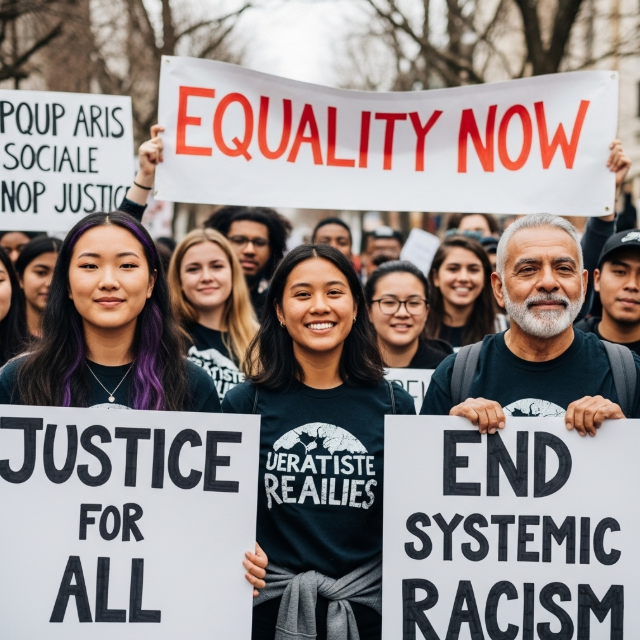The Power of Your Voice: Becoming a Social Justice Advocate Champion
In this comprehensive guide, you’ll discover how to master the art of advocating for social justice, achieve tangible impact in your efforts, and avoid common pitfalls that can hinder social justice progress. We’ll equip you with the knowledge and tools to effectively champion causes you believe in, transforming your passion into powerful action.
Let us quickly talk about Lisa Ma, a dedicated urban planner who, for years, felt a deep unease about the lack of accessible public spaces in her city. She saw firsthand how this disparity impacted individuals with disabilities and limited community engagement.
Lisa Ma:

Lisa initially felt overwhelmed, unsure where to even begin to address such a systemic issue. But by understanding the principles of effective social justice advocacy and applying strategic approaches, she learned to gather support, present compelling data, and ultimately influence policy changes that led to the creation of truly inclusive parks and community centers.
Lisa’s story isn’t just about parks; it’s about the profound impact one committed individual can have when empowered with the right knowledge and tools.
To help you on your journey, we’ve created a free, downloadable Social Justice Advocacy Checklist. This practical resource complements the strategies discussed in this article, providing a step-by-step guide to help you organize your efforts and maximize your impact.
Let’s get started
Watch this overview video or read the guide below.
Pro Tip: Map Power Structures Early – Before launching your advocacy efforts, take time to identify who holds power and influence around your issue, this includes policymakers, business leaders, institutional gatekeepers, and community influencers. Understanding their motivations, pressures, and interests allows you to craft persuasive messages and strategies that resonate.
Table of Contents – Advocating for Social Justice
- Understanding Social Justice Advocacy: Definitions and Core Concepts
- Building Your Advocacy Toolkit: Strategies for Effective Action
- Navigating Challenges and Sustaining Momentum
- Sustaining Your Spark: Self-Care and Community in Advocacy
- Download Your Social Justice Advocacy Checklist Here
- Conclusion
- Frequently Asked Questions
Pro Tip: Storytelling Is a Force Multiplier – Facts and statistics are essential, but emotionally compelling stories drive action. Pair your data with real-life stories that humanize the issue and connect with people’s values. A well-told narrative can move hearts, influence decision-makers, and inspire broader support for your cause.
Understanding Social Justice Advocacy: Definitions and Core Concepts
At its heart, advocacy for social justice is about actively working to dismantle barriers and create systems that ensure fairness and equity for all individuals and groups within society.
It’s about speaking up for those whose voices are marginalized and pushing for policies that promote human rights, dignity, and access to resources. This includes understanding the nuances of social justice advocacy definition and the fundamental principles that underpin effective action.

Whether you are an advocate for social justice in your daily life or aspire to be an advocacy practice for social justice professional, grasping these core concepts is essential. The essence of advocacy and social justice lies in the commitment to challenge systemic inequalities and champion a more just world.
Pro Tip: Begin your advocacy journey by clearly defining the specific social justice issue you wish to address. A focused approach allows for more targeted research and impactful action.
Building Your Advocacy Toolkit: Strategies for Effective Action
As you being to understand the core advocating for social justice principles, the next step is to learn how to advocate for social justice effectively. This involves developing a robust advocacy toolkit, integrating practical strategies, and learning from successful social justice advocacy examples.
Effective advocacy often begins with meticulous research and understanding the root causes of an issue. Gathering data, personal stories, and expert opinions can significantly strengthen your arguments. Learning from successful social justice advocacy examples can provide invaluable insights into what works and what doesn’t.
Furthermore, exploring what are the best ways to advocate for social justice often reveals that a multi-pronged approach, combining public awareness campaigns, direct lobbying, and community organizing, yields the most significant results. Developing these skills will empower you to become a powerful advocate of social justice. Ultimately, the goal is to implement social justice advocacy solutions that create lasting, positive change.
Pro Tip: Identify key stakeholders and decision-makers relevant to your chosen issue. Tailoring your message to their interests and concerns can significantly increase your influence.
Navigating Challenges and Sustaining Momentum
Even the best guide for advocating for social justice with examples and solutions will acknowledge that the path to change is rarely straightforward.
Advocating for social justice can be a challenging, long-term endeavor, often encountering resistance and setbacks. It’s crucial to develop resilience, build strong alliances, and maintain momentum despite obstacles. This section will explore strategies for overcoming common challenges, such as apathy, opposition, and burnout, while emphasizing the importance of celebrating small victories.
Sustaining your energy and passion is key to long-term impact. Building a network of like-minded individuals and organizations can provide crucial support, shared resources, and collective power, amplifying your efforts and helping you implement effective social justice advocacy solutions.
Pro Tip: Foster strong partnerships and collaborations. Collective action amplifies your voice and resources, making your advocacy efforts more impactful and sustainable.
Sustaining Your Spark: Self-Care and Community in Advocacy
While the drive to advocate for social justice is powerful, it’s a marathon, not a sprint. The emotional and intellectual demands of consistent advocacy for social justice can be significant, making self-care an often-underestimated but crucial component of long-term effectiveness. Just as a well needs to be refilled, so too does your energy and passion.
This isn’t about being selfish; it’s about ensuring you can continue to be a strong advocate of social justice without succumbing to burnout.
Practical strategies include setting clear boundaries, dedicating time for personal rejuvenation, and recognizing your limits. Moreover, building a supportive community is paramount. Connecting with other advocates for social justice creates a vital network for shared learning, emotional support, and collaborative action.
These alliances can provide invaluable insights into new social justice advocacy solutions and offer a space to debrief and recharge. Remember, the journey of advocacy and social justice is more sustainable and impactful when undertaken with a mindful approach to your well-being and in the company of a supportive collective.
Pro Tip: Regularly schedule “advocacy-free” time for hobbies, relaxation, or spending time with loved ones. This deliberate pause helps prevent burnout and keeps your advocacy efforts fresh and impactful.
Download Your Social Justice Advocacy Checklist Here
Ready to put these strategies into action?
Our comprehensive Social Justice Advocacy Checklist is designed to guide you step-by-step through the process of planning, executing, and evaluating your advocacy efforts. This practical tool will help you stay organized, prioritize tasks, and ensure you’re covering all the essential elements for effective social justice work.
📥 Click here to download your Social Justice Advocacy Checklist now!
Pro Tip: Track your goals, contacts, communications, milestones, and setbacks. Whether you’re planning a campaign or reflecting on your impact, well-organized records will help you stay on course, demonstrate your effectiveness to funders or allies, and scale your efforts more efficiently in the future.
Whether you’re planning a campaign or reflecting on your impact, well-organized records will help you stay on course when advocating for social justice, demonstrate your effectiveness to funders or allies, and scale your efforts more efficiently in the future.
Conclusion
Becoming a powerful advocate for social justice is a journey that requires dedication, strategic thinking, and a commitment to continuous learning. By understanding the core concepts, building a robust advocacy toolkit, and learning to navigate challenges, you can transform your passion into tangible, positive change.
Remember Lisa Ma’s story – your voice, when empowered with knowledge and action, can truly shape a more equitable world.
We hope this guide has provided you with valuable insights and inspired you to take meaningful action in your pursuit of social justice.
Pro Tip: Document Everything and Stay Organized – Track your goals, contacts, communications, milestones, and setbacks.
Frequently Asked Questions – Social Justice Advocacy Solutions
What is the primary goal of social justice advocacy?
The primary goal of social justice advocacy is to challenge and transform systemic inequalities to create a more equitable and just society where all individuals and groups have equal access to opportunities, resources, and rights.
How can I identify the most pressing social justice issues in my community?
You can identify pressing social justice issues in your community by listening to marginalized voices, researching local statistics, engaging with community organizations, and observing disparities in access to education, healthcare, housing, and other essential services.
What are some common challenges faced by social justice advocates?
Common challenges include encountering resistance from entrenched systems, facing apathy or lack of awareness from the public, experiencing emotional burnout due to the demanding nature of the work, and securing adequate resources and funding for initiatives.
Is it necessary to be an expert in a specific field to advocate for social justice?
No, it is not necessary to be an expert in a specific field. While expertise can be beneficial, effective social justice advocacy often relies more on passion, strong communication skills, the ability to build coalitions, and a willingness to learn and adapt.
How can I measure the impact of my social justice advocacy efforts?
Measuring impact can involve tracking policy changes, observing shifts in public opinion, noting increases in resource allocation for affected communities, documenting media coverage, and assessing the direct improvements in the lives of those you are advocating for.
If you have more questions about what are the best ways to advocate for social justice, reach out to us.
Note: Content on this website (socialworkportal.com) is copyrighted and protected under applicable copyright laws. Unauthorized reproduction, distribution, or use of any content from the website, without explicit written permission, is strictly prohibited. Read: Terms of Use.
Social Work Portal Disclaimer: Social Work Portal is not a social work agency and we do not refer social workers. This web site is provided for educational and informational purposes only and does not constitute providing medical advice or professional social and healthcare services. The information provided should not be used for diagnosing or treating a health problem or disease, and those seeking personal medical advice should consult with ... Read our full disclaimer here: Social Work Portal Disclaimer.




